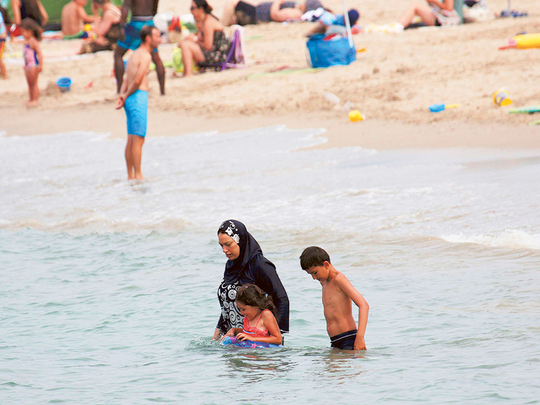
Paris: The debate is so heated in France that one could be forgiven for assuming that the burkini – the full-body bathing suit worn by some Muslim women – had invaded French beaches. Five towns have banned them. Three more are in the process of doing so. Prime Minister Manuel Valls supported the prohibitions on Wednesday, calling the garment part of “the enslavement of women.”
In fact it would be challenging to spot a burkini on most French beaches, and even some of the mayors considering the bans admit to never having seen one.
But with a presidential election approaching next year, and the nation on edge after a series of terrorist attacks – including one that killed 85 people this summer along the French Riviera – the burkini has become a dividing line in France’s increasingly fraught relationship with its Muslim population, Europe’s largest.
That there is no clear definition of what qualifies as a burkini, and that Muslim women have complained of being singled out on beaches even when covered by other kinds of garments, has raised the question of whether the bans are meant to signal France’s demand for conformity with its non-Muslim majority or are genuinely part of France’s culture of laicitE, or secularism in public life.
That debate is a continuation of deep-seated discomfort in France with Muslim women’s dress that has defied simple categories of left and right, leaving Valls, a Socialist, sounding a lot like the presidential hopeful for the centre-right, Nicolas Sarkozy, or for that matter, Marine Le Pen, the leader of the extreme-right National Front.
“This is the soul of France that is in question,” Le Pen wrote in a blog post that strongly supported the burkini ban. “France does not lock away a woman’s body, France does not hide half of its population under the fallacious and hateful pretext that the other half fears it will be tempted.
“The French beaches are those of Bardot and Vadim,” she said, referring to movie star Brigitte Bardot and Roger Vadim, a screenwriter known for his sensual movies, not those of “Belphegor,” she added, referring to a television serial about a lugubrious ghost in a long cape that haunted the Louvre Museum.
Valls, in an interview published on Wednesday in La Provence, the daily newspaper in Marseille, called the burkini part of a “political project” to enslave women.
Laurence Rossignol, a feminist and the Socialist minister for families, children and women’s rights, called the burkini “profoundly archaic” and “not just a new kind of bathing attire” but a garment with a deeper meaning.
“That meaning is to hide, to conceal the women’s bodies, and the position it accords to women is a position that I fight against,” she said in a television interview.
There is little doubt that politics, cultural prejudices and latent fear after a terrible season of terrorism in France have inflamed the debate.
The mayors who have enacted bans justify them with vague rationales that include maintaining public order and hygiene, “good morals” and laicitE.
The reality is far less clear, and in fact the presence of burkinis could be taken as a sign that at least some French Muslims have a relatively liberal stance, said Marwan Mohammad, the executive director of the Centre Against Islamophobia in France.
In conservative Muslim countries, women would never go to a beach with men, much less go swimming, since even in the burkini the wet cloth sticks to a woman’s body.
“This is a good news in a way because it means Muslim women who didn’t use to enjoy that day at the beach or at the pool are now taking part. They are socialising,” he said.
The Centre Against Islamophobia challenged the ban in Cannes, and lost, but is appealing that decision.
Meanwhile, the Council of State, which determines whether such bans meet French legal requirements, is reviewing the local ordinances and was expected to rule on Thursday.
However, the more important and dangerous point, Mohammad said, is that there is no legal definition of the burkini. Typically many Muslim women, who do not want to spend 40 to 125 euros for a burkini, wear a T-shirt and long pants. Some even take off their hijab; others put on a bathing cap.
He said that six Muslim women who complained to his centre in the past week were asked to leave public beaches even though they were not wearing burkinis.
“One was wearing a long-sleeve T-shirt and pants with a head scarf, and another was wearing an actual competition bathing suit, like they wear in the Olympics, and a bathing cap, and she was taken off the beach,” Mohammad said.
However, he added, “her mother was wearing the hijab and was enjoying a picnic on the beach,” and the fact that she was Muslim and wearing a bathing cap was enough to cause local officials to ask her to leave.
In Cannes, where a ban on the burkini was enacted last week, at least six of the 10 women who complained to a local Muslim association were simply going into the sea with their bodies covered. Violators of the ban are asked to leave the beach and can be fined 38 euros ($42, Dh157).
On Saturday, brawls broke out at a beach in Corsica after some beachgoers began taking photographs of Muslim women wearing burkinis, prompting the mayor of the town of Sisco to ban the full-body bathing suits.
The slippery slope of such restrictions came into view with a law in 2004 that banned the wearing of overt religious symbols in public primary and secondary schools. It included wearing the Jewish kippa, large crosses and the hijab but affected disproportionately those wearing the hijab because there are few parochial schools for Muslims, so they have no choice but to go to state schools.
But in colleges, the hijab and other signs of religious faith are acceptable, and there is no law against them in daily life unless a person works for the French government, where all signs of religious practice are prohibited.
In 2010, the parliament approved a law banning in public any clothing that hides the face. While worded generally, the debate focused on the full-face veil, sometimes called the burqa. The reason given was public safety.
More recently, politicians have begun to compete in further regulating clothing worn by Muslim women. One of the candidates for the nomination of the right-leaning Republican party, Sarkozy, has called for banning the hijab in university settings.
“Islamophobia is very emotional. There’s not only a religious element. There is a sexist element and a racist element, and with the burkini there’s a real need to control women’s bodies,” Mohammad said.
One mayor, describing a ban on burkinis he was about to enact in a town in the north of France, was unable to say why it was so necessary.
Olivier Majewicz, a Socialist mayor in Oye-Plage on the English Channel, said he was on the beach Sunday speaking to lifeguards, “when I saw a woman dressed in black from head to toe; she was wearing a burqa and looking out towards the ocean.”
The woman’s garb took him by surprise, Majewicz said, adding that she was not doing anything disturbing.
“It was a beautiful, warm, sunny day,” he said.
“We are in a small town, and the beach is a small, family-friendly place,” he continued. “It’s also a bit wild, close to nature.”
The woman’s attire, he said, did not correspond with “what one normally expects from a beachgoer.”
He has never seen a burkini in Oye-Plage and neither had the mayor of Le Touquet, another English Channel town, seen one there, but both are planning bans.
Further complicating matters is the deeply held belief that government should not be tainted by religion, an idea referred to as laicitE, a concept for which there is no English translation. It dates from the bitter wars here between Protestants and Catholics and the later efforts by many to curtail the powers of the Catholic Church, which had long been allied with the monarchy and conservative political forces in France.
Although politicians often cite laicitE as a reason for prohibiting Muslim and other religious attire, in fact that is a misconception, said Nicolas Cadene, the spokesman for the government’s Observatory on LaicitE.
“During crises, there are crises of passion, of looking to your own experiences, of retreating, of rising fear,” he said. “One must not overreach in such a climate. We need to calm down the situation.”
“One should not exploit laicitE for partisan ends and to stigmatise people,” he added.












